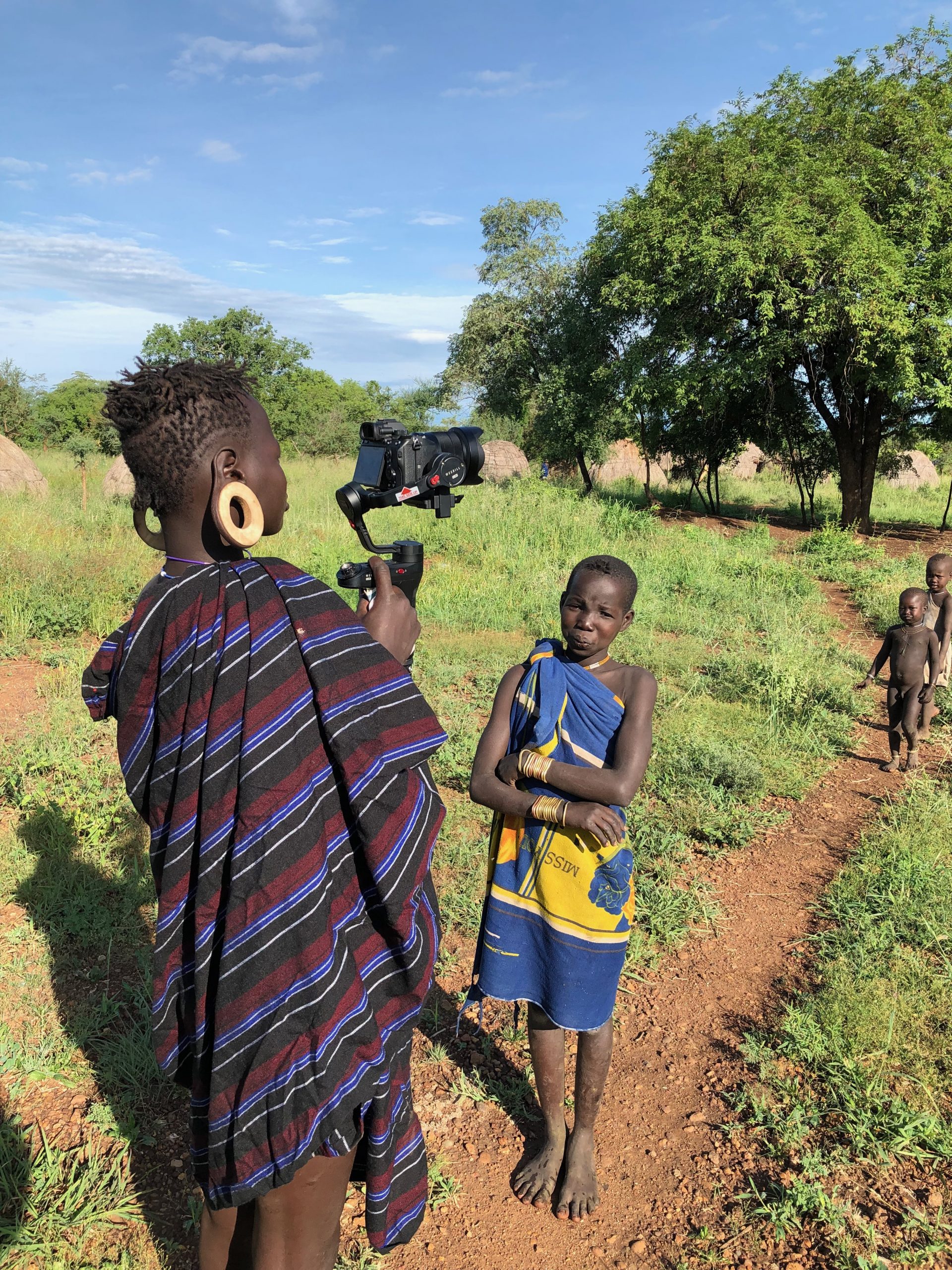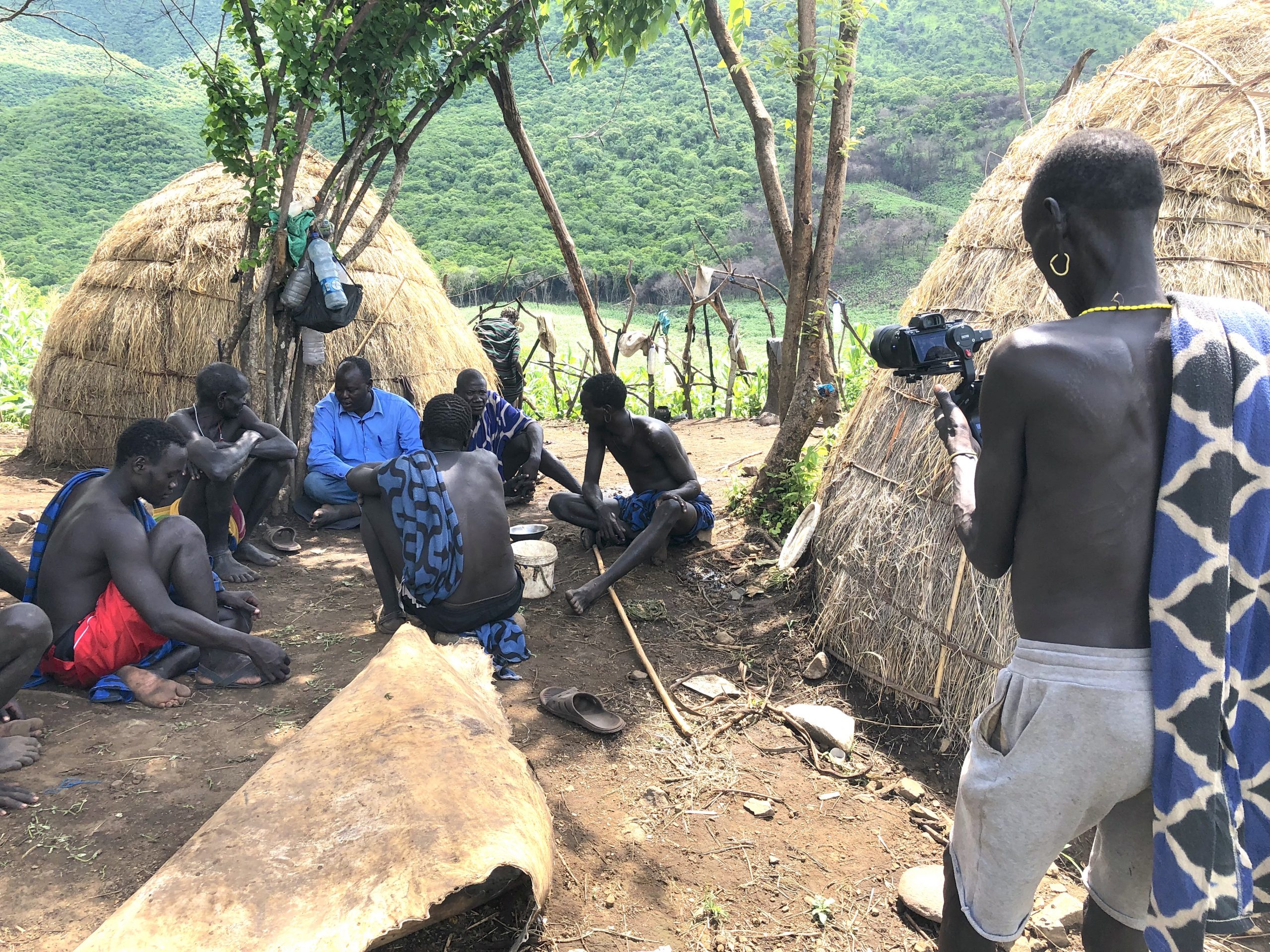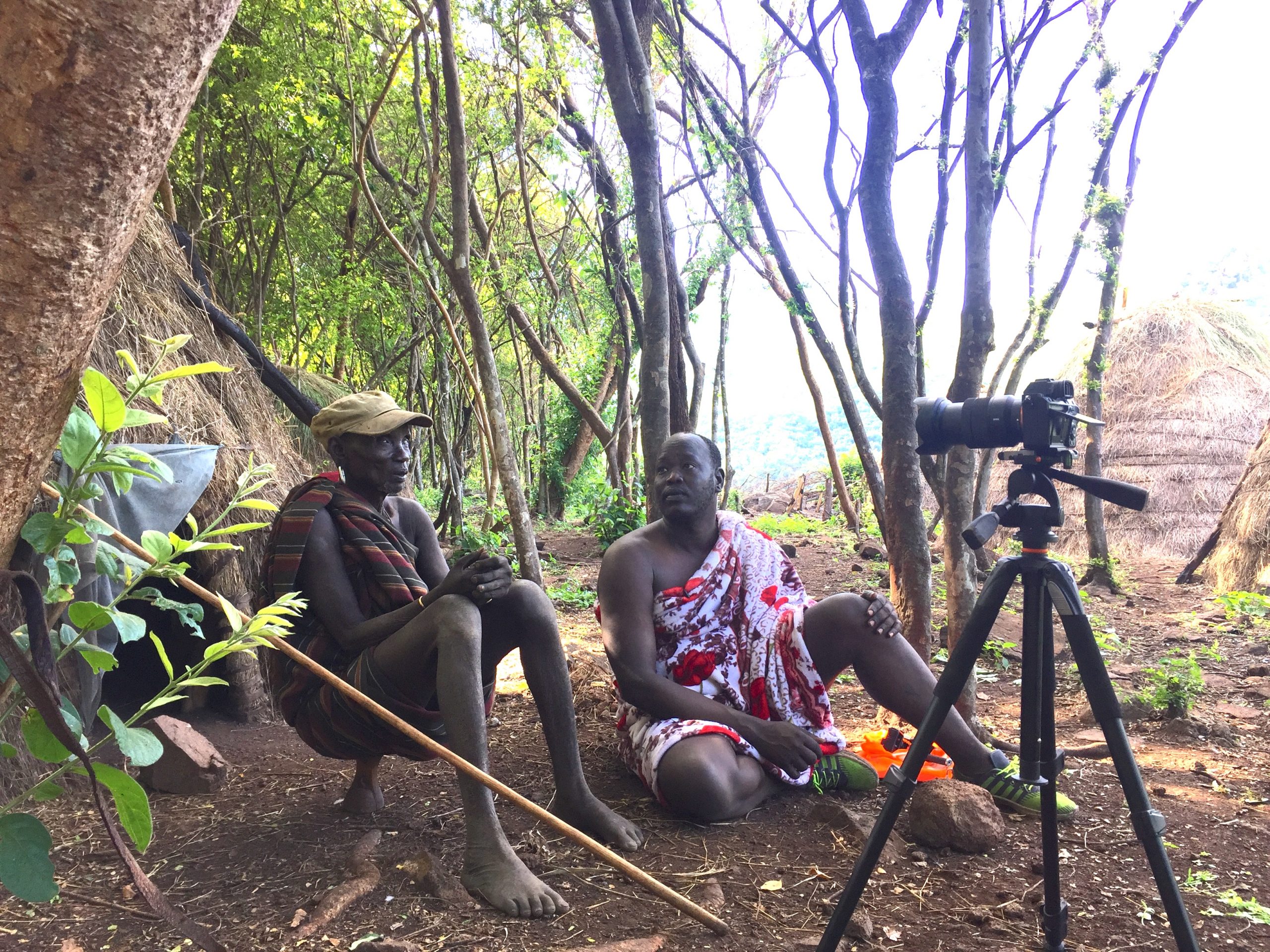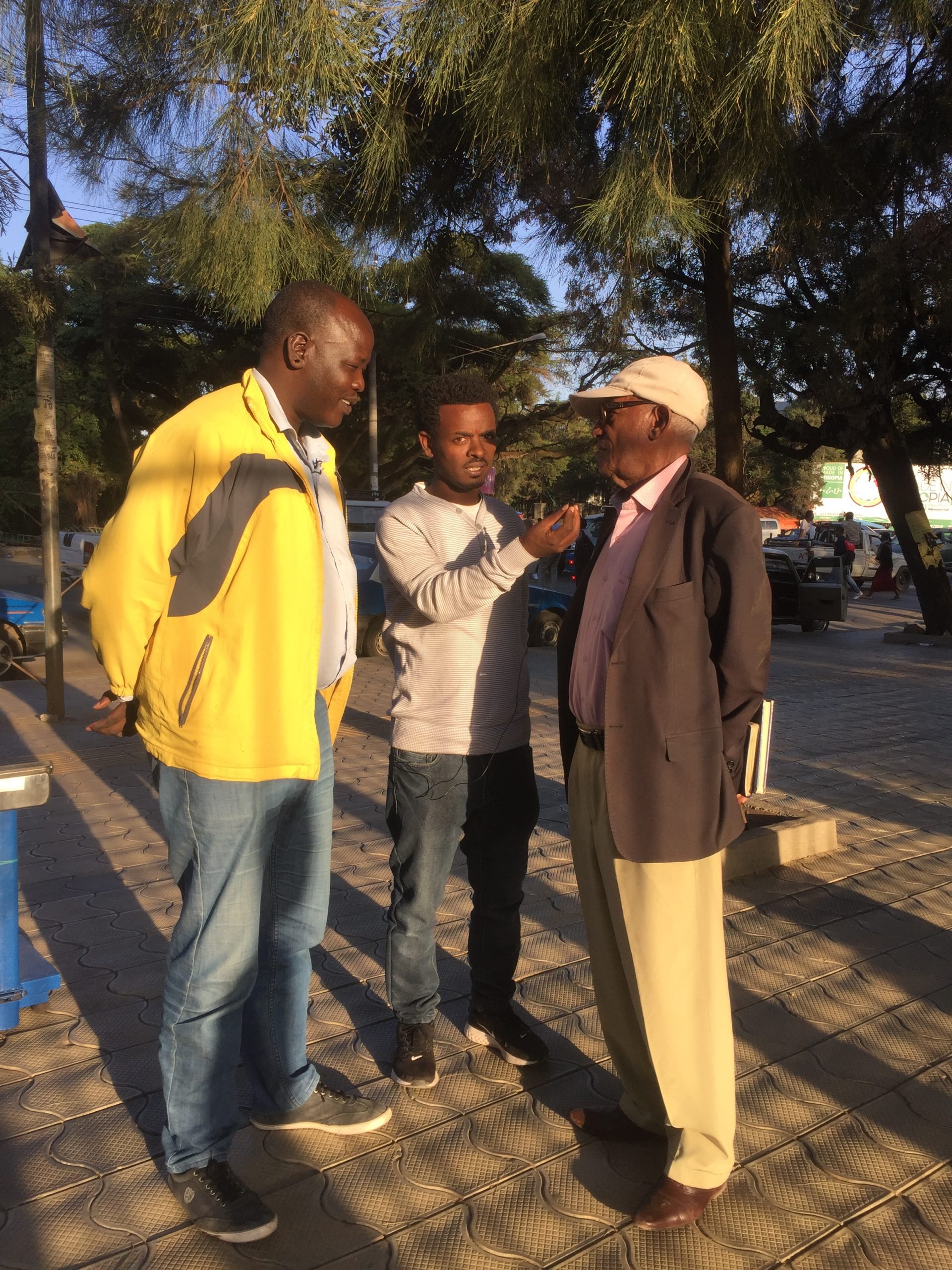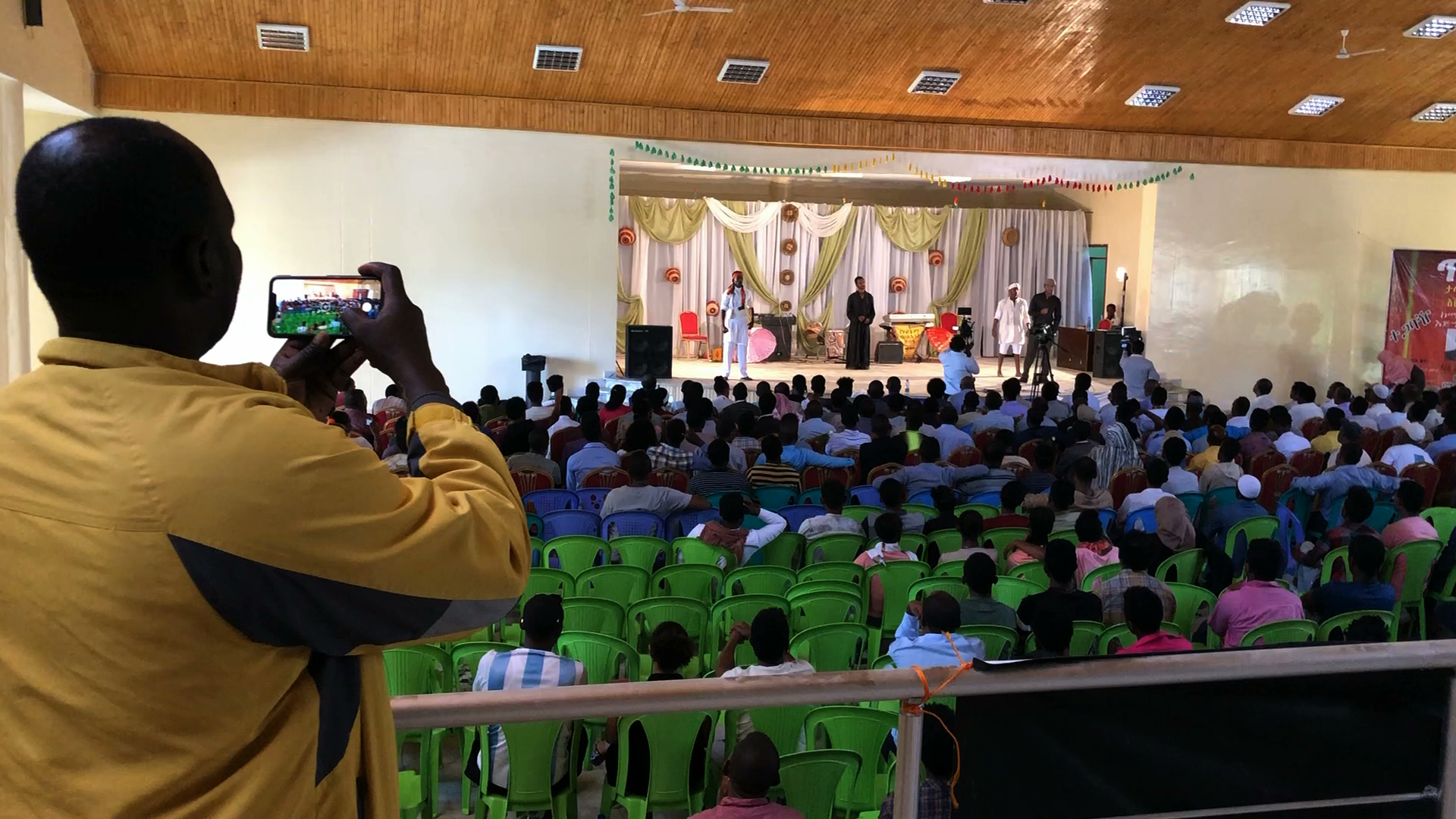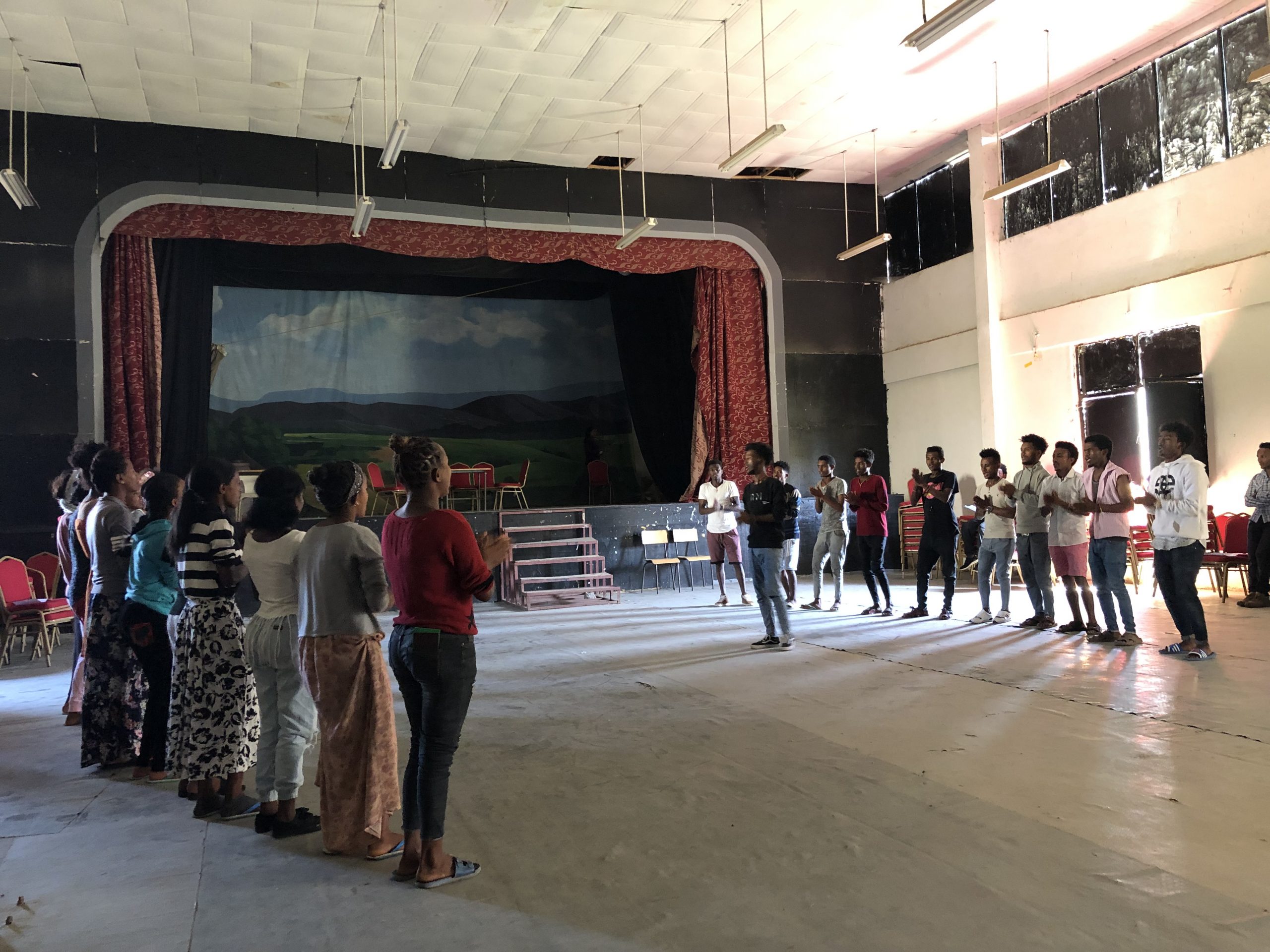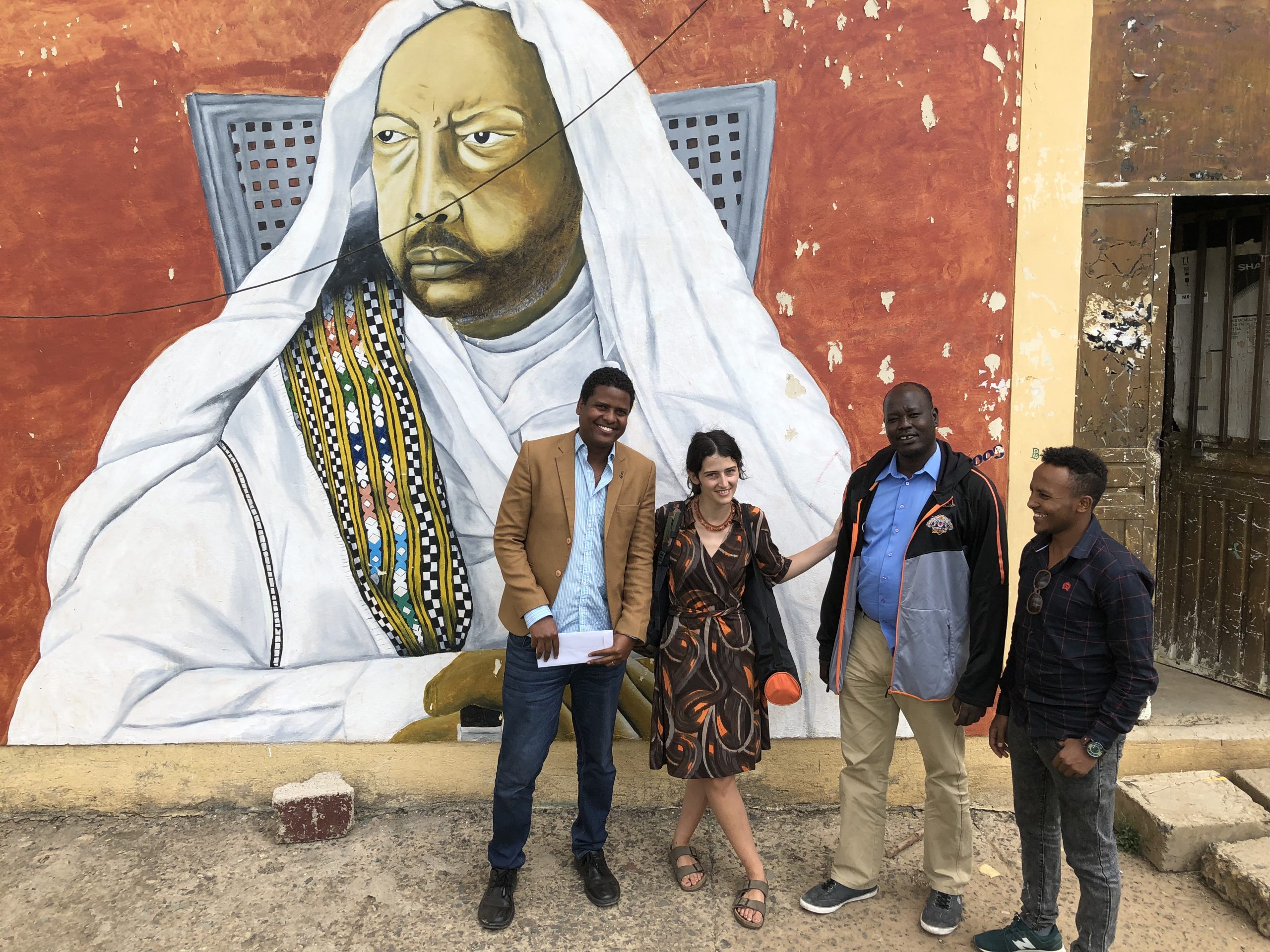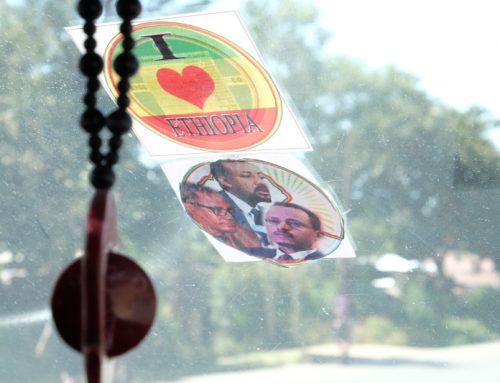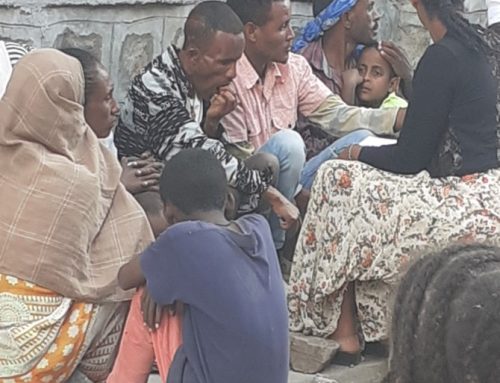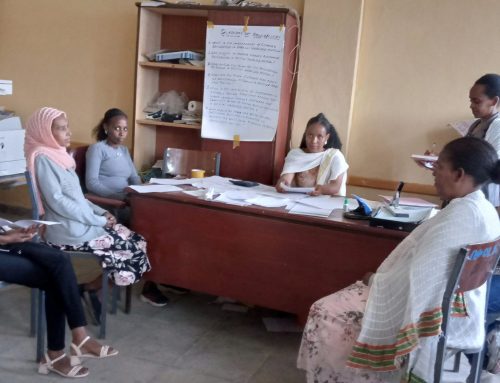Olisarali Olibui with the South Omo Theatre Company, Wolkite University and SOAS University of London

South Omo Theatre Company
This coalition between researchers and creative artists is using performance, theatre and ethnography to explore and imagine what fuller political representation of marginalised groups in Ethiopia might look like against the backdrop of radical reforms and government commitment to indigenous theatre. The project focuses on the Mursi (Mun, or Muni, singular, as the self-designation), a group in Southern Ethiopia who remain excluded from regional and national politics.
Olisarali is a Mursi leader who travelled to Australia to learn English. He returned with a video camera which he used to portray Mursi life and culture. ‘Shooting with Mursi’, produced by film-maker Ben Young, has become a historical record of a moment of change for the Mursi. Following this, Olisarali became interested in art as a mechanism for doing research and advocating for the rights of the Mursi and neighbouring indigenous groups.
In 2018 Olisarali and Ben Young formed the South Omo Theatre Company (SOT) with Alexandra Genova and Shauna LaTosky. Olisarali participated in a theatre training workshop in 2019, organised by Wolkite University and the South Omo Theatre Company, where he experimented with film, dance, song and storytelling as a medium for teaching others about his culture and people. Alexandra Genova (SOT) reflected on the university’s theatre course as a catalyst for positive socio-political change and bridging ethnic tension in an article for the Guardian newspaper.
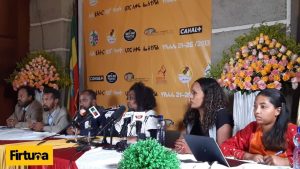
100th anniversary of Modern Ethiopian Theatre
Olisarali then worked with Tesfahun Hailu (Mekelle University) to script and stage a play, written in the Mursi language and performed by Mursi people, to educate outsiders about both their culture, dispute resolution and pressures on their land and resources. The aim was to bring greater awareness about the Mursi to Ethiopian people more generally, and to influence and change opinions amongst policy-makers towards the inclusion in national politics of all South Omo region’s ethnic groups. The play was informed by interviews and group discussions conducted by the team in Mursiland, Addis, and Wolkite about the ways in which the Mursi achieve and maintain effective governance, and why and how they believe these are changing both within the community and through external pressures. South Omo Theatre Company is an official partner of 100th Anniversary of Ethiopian Modern Theatre, which is staging 50 theatre shows in 7 days across the capital in 2021, and a partner of the Ethiopian Theatre Professionals Association.
During the first half of 2022 Olisarali and the Mursi actors worked with Asteway Mellese, Meron Tesfaye and Yosef Hailu Kebede (Theatre Studies lecturers, and professional theatre directors, at Wolkite University) to refine the script and teach the actors about theatre. The directors had to learn about the complexity of Mursi culture; the actors were initially puzzled by the separation between stage and audience, but took to acting easily, rehearsing intensively and staying in student accommodation (thanks to the generosity of Wolkite University). Lighting and Projection Designer, Sharon Huizinga (Asst. Professor of Lighting Design at University of Cincinnati’s College-Conservatory of Music) joined the team for two weeks to bring state-of-the-art donated lighting equipment, to set up not only lighting and projection equipment for the production, but teach technicians at Wolkite University and The National Theatre of Ethiopia in Addis Ababa how to use it longer-term. The flawless technical design and production was due to her.
The first performance was premiered on 25 July 2022 and received with extraordinary enthusiam by the audience including journalists from three TV stations. The performance at the National Theatre of Addis Ababa on 31st July 2022 was also watched in amazement and broadcast or reported on national TV multiple times. Olisarali and colleagues did a series of interviews about the process and the challenges Mursi people are facing, including clips of the play, including one with Fana television (with over 1m subscribers), several with Arts TV on part 1, part 2, and part 3, one with Nahoo TV, another with DireTube, and yet more with Balageru TV, part 1 and part 2.
The development, production and mediation involved in this theatre production was both filmed by Ben Young and Alexandra Genova (with assistance from Seyifeslase Endale) and documented as an ethnographic study by Richard Axelby (SOAS University of London). The film, articles and eventually a book are all currently in production. The next steps will be to create opportunities for Olisarali to lead delegations of Mursi to promote peace with neighbouring groups, improve encounters with outsiders (including with tourists) and use this Mursi-led theatre, film and scholarship to influence government to fully implement their commitments to pastoralist groups in South Omo.

The team are also working on various academic articles. The first, ‘Performing Donga: Gender, Aesthetics and Theatre in Mun (Mursi)’ by Shauna LaTosky and Olisarali Olibui, is about how Donga, a ritualized form of dueling practiced by the Mun of southwest Ethiopia, is not only a competitive sport, but a ritual performance through which the tensions, predicaments and conflicts of society are confronted and resolved. As articulated in the anthropological literature, donga contests con
A second article, ‘Indigenous theatre as a pathway to cultural heritage rights in Southern Ethiopia’ by Shauna LaTosky, Tesfahun Hailu, Olisarali Olibui and Asteway Mellese, provides a pathway into the potential that indigenous theatre can offer performance practitioners and theatre scholars in Southern Ethiopia and beyond. It asks how does indigenous theatre allow for a better understanding of inequalities in theatre studies in Southern Ethiopia? We also ask how indigenous theatre can help us to recognize the generative potential of such performances, especially in relation to the assertion of rights to cultural heritage? Drawing our attention to the first Mursi/Mun-authored performance, ‘Tirainya ko Koisani’ (Playing the Mediator), we offer insights into the past, present and future of indigenous theatre in Southern Ethiopia, and suggest indigenous methodologies as a corrective for addressing inequities in Ethiopian theatre, but also for facilitating accountability in historical, political, ethnographic and practical ways in the future.
All photography on this page is by Ben Young unless otherwise specified
About the team
Olisarali Olibui is an agro-pastoralist from South Omo, and a member of the Mun ethnic group. He is an award-winning documentary-maker, whose film ‘Shooting with the Mursi’ provides the context for this new project imagining what political inclusion of the Mun might look like. Olisarali has an avid interest in sharing Mun indigenous knowledge with others, and has also translated school books, cultural books, and veterinary and clinical books into the Mun language.
Alexandra Genova is an independent journalist and filmmaker who has worked for platforms including the Guardian, Al Jazeera, National Geographic, NYT, and broadcast channels like ITN, ITV and Channel 4. She has also worked on assignment with Magnum photographers including Martin Parr and reported around the world from Ghana to Ethiopia. Alexandra has a Masters’ degree in magazine journalism and has a particular interest in social and racial justice, agriculture and food, and indigenous peoples.
Tesfahun Hailu, a filmmaker, theatre practitioner, and lecturer of Theatre Studies. He studied Master of Arts in Theatre and Development at Addis Ababa University. He has written and directed several plays in Ethiopia and has worked as director and cameraman for four ethnographic films, which are selected and screened in different international film festivals. Olisarali and Tesfahun combine their efforts with the host organization, South Omo Theatre Company, whose broader set of aims includes promoting indigenous performance, participation, and integration into Ethiopia’s theatre scene by producing research-based creative outputs designed to positively impact Mun political inclusion.
Sharon Huizinga has been a lighting designer, programmer and educator for over 20 years. Until recently she was based in Amsterdam where she was working for the Dutch National Opera & Ballet, for ETC as the Field Project Coordinator for Northern Europe, lecturing for the Academy voor Theatre en Dance Amsterdam and designing lighting, projection and scenery for multiple European/Russian tours with Deva Premal & Miten. There were also American and Canadian chapters that included lots of lighting design for theatre and dance, some Olympics and Paralympics, some NYC and Broadway, some Detroit Auto show, one tiny house built, and being Lighting Director for the Home States Ball at the 2009 Presidential Inauguration. Touring Credits include Designs for Diana Krall, Jesse Cook, Lighting Direction for Norah Jones, Ballet British Columbia, and more technical things for Cirque Du Soleil. She is currently head of the MFA lighting program at University of Cincinnati’s CCM.
Shauna LaTosky is a cultural anthropologist who has been working with the Mursi intermittently since 2003. She has substantial field experience and knowledge of the Mursi people, culture and language. Her publications include, for example, Predicaments of Mun (Mursi) Women in Ethiopia’s Changing World (2013), ‘Customary land use and local consent practices in Mun (Mursi): A new call for meaningful FPIC standards in Southern Ethiopia’ (2021) and ‘The Social Role of Purging in Mun (Mursi)’ (2021).
Asteway Mellese is an experienced lecturer in Theatre Studies in Ethiopia, with an MA in Theatre and Development. He has worked as an independent journalist, producing and broadcasting biweekly infotainment radio shows in local and national radio stations. Since 2014, Asteway has successfully organised many national and international academic and theatrical events.
Meron Tesfaye has been a lecturer at Wolkite University for the last 8 years. She is working in the Theatre Arts department with BA degree in Theatre and Masters degree in English Language and Literature. She has undertaken numerous research projects and managed community services in Southern Ethiopia, which mainly focus on theatre, language and culture.
Ben Young is an award-winning filmmaker, editor and sound designer who received an International Emmy nomination for his work on a documentary about young actors with Downs Syndrome. He has directed, filmed, and edited several broadcast documentaries about remote and marginalised peoples for National Geographic and the Discovery Channel; and in the 1980s and 1990s he worked in music production across Europe. Ben’s affiliation with Olisarali dates back to their discussions and shared interest in representing threatened indigenous communities through film.

